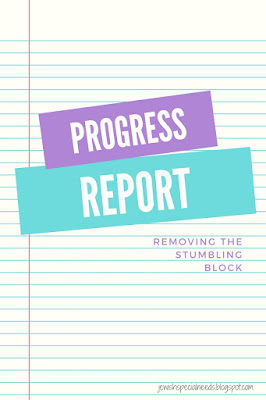One of the things that many religious school education directors will
agree is a part of the job they like least is progress reports. Why?
1. Producing documents that are meaningful to parents as a way of
acknowledging their children’s growth and development can be difficult. Typical
reports focus on deficits rather than strengths, and check-offs or even a short
narrative can’t always offer a full picture of a student.
2. Encouraging teachers to write comments and remarks that are
thoughtful, productive and demonstrate that they have gotten to know their
students as individuals can be really hard.
3. Getting teachers to submit their reports in a timely way can be
a huge challenge.
 I am frequently asked to describe how we built our culture of
inclusion. I find that I often speak about inclusion in our school matter-of-factly
because inclusion is who we are, not simply a thing that we do. I recognize that
it can take a lot of time and commitment to get everyone on that page, and I
don’t dismiss what it took to get us to this place. There are many
behind-the-scenes conversations about values and the importance of supporting
each child and each family. We don’t shy away from the hard work needed to
support individual students in appropriate ways, but neither do we dwell on this
as something that is a burden or a frustration. Again, it’s part of who we are
and what we value, so we do what is necessary.
I am frequently asked to describe how we built our culture of
inclusion. I find that I often speak about inclusion in our school matter-of-factly
because inclusion is who we are, not simply a thing that we do. I recognize that
it can take a lot of time and commitment to get everyone on that page, and I
don’t dismiss what it took to get us to this place. There are many
behind-the-scenes conversations about values and the importance of supporting
each child and each family. We don’t shy away from the hard work needed to
support individual students in appropriate ways, but neither do we dwell on this
as something that is a burden or a frustration. Again, it’s part of who we are
and what we value, so we do what is necessary.“Josh* works hard in our class each week. He is a good listener, follows directions and gets along well with his classmates. He is very active and will take breaks from class when needed. He will ask to leave the room and is always respectful. I adore him! I look forward to working with him over the rest of the year. If there is anything I can do to make class more enjoyable and/or manageable for him, please let me know.”
“Seth* is continuing this year on the same great track he left off on last year. The ease with which he is acquiring Hebrew skills this year is absolutely wonderful, his reading and writing are improving beautifully, and he is getting better and better at making connections between old lessons and new ones…And he is getting better at vocalizing when he is struggling himself. He more frequently seeks out help rather than trying to work through challenges entirely on his own.”
And it is equally as satisfying to read how our teachers embrace our students’ unique personalities and abilities and use them to enrich a classroom environment:
The next time you are feeling frustrated by the process and product of progress reports, I encourage you to think of them in a new way. I hope you will use them as a tool to reflect on and enhance your own school’s inclusive practice.“Sarah* is very artistic and creative. She is a free thinker and very confident. She really enjoys and contributes to our class.”
Sign up here to be sure you never miss a post from Removing the Stumbling Block:

No comments:
Post a Comment